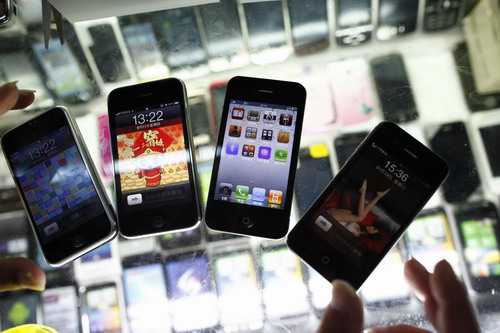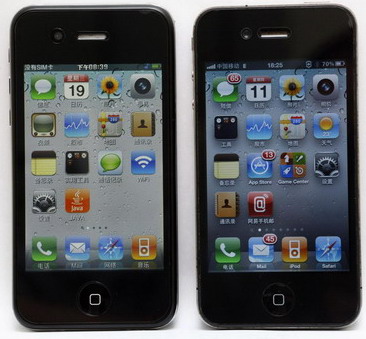'hiPhone' now a hot commodity on Taobao
Updated: 2011-08-17 14:21
By Hao Nan (China Daily)
|
|||||||||||
|
 |
|
Fake iPhones are displayed at a mobile phone stall in Shanghai August 11, 2011. [Photo / Agencies] |
A hot-selling smartphone that carries the brand "hiPhone" has copied nearly every function of the iPhone and even added some new features.
Unlike the actual product from Apple, the hiPhone can accommodate two SIM cards and has a built-in radio receiver - all for the astonishingly low price of about 500 yuan ($78.30).
It is made in Shenzhen, according to local media reports - but a company location is not included in its online sales promotion.
Its iPhone likeness and low price have made the hiPhone very popular on Taobao, China's biggest online shopping portal.
|
 |
|
A "hiPhone 5" (L) and Apple's iphone 4 are pictured in Shanghai August 11, 2011. [Photo / Agencies] |
Though the hiPhone has a host of functions, its low-quality components could result in a short lifespan, said He Guili, director of the China Telecommunication Technology Labs at the Ministry of Information and Industry Technology.
And like many fake products, it could also be dangerous.
"Most copycat mobile phones have problems, especially higher radiation than the genuine phones, which pose serious health risks," He noted.
But the hiPhone comprises just a tiny portion of the copycat electronic products made in China, part of the rampant "shanzhai" culture.
The actual translation of the word shanzhai simply means "mountain village", but it has taken on a broader meaning as a term for pirate brands and products.
"China will tighten its control on this illegal action because many shanzhai products violate the intellectual property rights of others and should be regarded as piracy rather than innovation," said Tian Lipu, director of the State Intellectual Property Office.
"There is no country that can survive and thrive on piracy and that's why we have established the national intellectual property protection strategy to fight these acts," he added.
David Llewelyn, a legal expert and deputy chairman of the Intellectual Property Academy of Singapore, said shanzhai products actually prevent companies themselves from achieving sustainable success.
"If a company builds its product line by copying some other company's products, it can never be innovative or creative," he added. "The best way for them is to stop imitation and start creating their own brands."
Yet the fight against shanzhai culture may prove to be a tough task.
According to the research firm GFK, shanzhai mobile phones had about 30 percent of China's handset market in 2009. In the era following the global economic crisis, shanzhai products could be popular than ever, it said.













